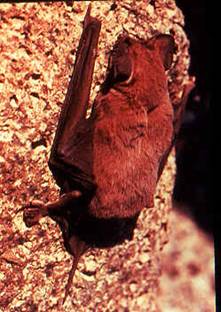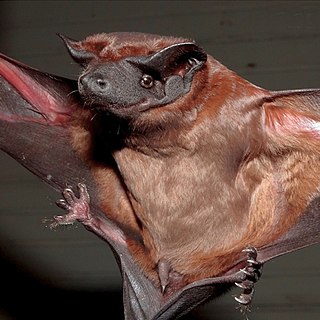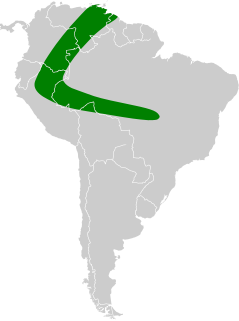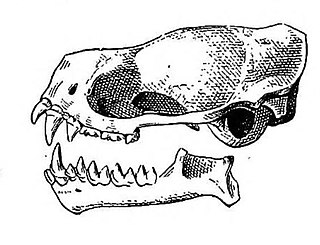
Coenraad Jacob Temminck was a Dutch aristocrat, zoologist, and museum director.

The Molossidae, or free-tailed bats, are a family of bats within the order Chiroptera. The Molossidae is the fourth-largest family of bats, containing about 110 species as of 2012. They are generally quite robust, and consist of many strong-flying forms with relatively long and narrow wings with wrinkled lips shared through their genus. Their strong flying forms allows them to fly 60 miles per hour using tail winds and at altitudes over 10,000 feet. This makes them unique among bats, as they are the only bat family that withstands the elevation. They are widespread, being found on every continent except Antarctica. They are typically found in caves, abandoned mines, or tunnels.

The cinnamon dog-faced bat, is a South American bat species of the family Molossidae. It is found in northern and central South America.

The southern dog-faced bat, is a Central and South American bat species of the family Molossidae. It is found in northern Argentina, Bolivia, Brazil, Colombia, French Guiana, Guyana, Panama, Peru, Paraguay, Suriname and Venezuela.

The rufous dog-faced bat, is a bat species from South America. It is found in Argentina, Brazil, Colombia, Guyana, Peru and Suriname.

The dwarf dog-faced bat is a species of free-tailed bat from South America. It is found in Argentina, Bolivia, Brazil, Colombia, Ecuador, Guyana, Peru, Paraguay and Uruguay, typically at lower elevations. It is one of two species in the genus Molossops, the other being the rufous dog-faced bat. Three subspecies are often recognized, though mammalogist Judith Eger considers it monotypic with no subspecies. It is a small free-tailed bat, with a forearm length of 28.9–32.5 mm (1.14–1.28 in) and a weight of 5–8 g (0.18–0.28 oz); males are larger than females. It is brown, with paler belly fur and darker back fur. Its wings are unusual for a free-tailed bat, with exceptionally broad wingtips. Additionally, it has low wing loading, meaning that it has a large wing surface area relative to its body weight. Therefore, it flies more similarly to a vesper bat than to other species in its own family. As it forages at night for its insect prey, including moths, beetles, and others, it uses two kinds of frequency-modulated echolocation calls: one type is to navigate in open areas and to search for prey, while the other type is used for navigating in cluttered areas or while approaching a prey item.

The Mato Grosso dog-faced bat, is a bat species from South America. It is found in Brazil, Colombia, Guyana and Venezuela.

Greenhall's dog-faced bat is a South American bat species of the family Molossidae. It is found in Colombia, Peru, Ecuador, Venezuela, the Guianas, northeastern Brazil and Trinidad.

Cynomops is a genus of Central and South American dog-faced bats in the family Molossidae. It has sometimes been considered a subgenus of Molossops. It contains the following species:

Cynomops milleri is a species of bat that is native to South America. It was previously considered a subspecies of the Para dog-faced bat. It is considered a small- to medium-sized member of its genus. It is classified as least concern by the International Union for Conservation of Nature because it appears to be common and widespread. It is found in Venezuela, French Guiana, Guyana, Suriname, Brazil, and Peru.

Eumops nanus is a species of bat found in Central and South America.











